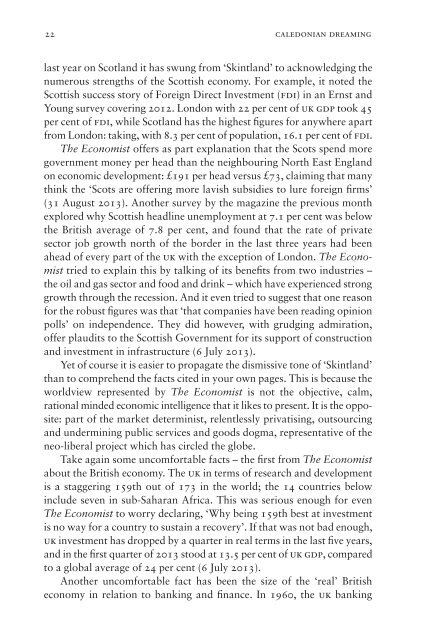Caledonian Dreaming by Gerry Hassan sampler
Caledonian Dreaming: The Quest for a Different Scotland offers a penetrating and original way forward for Scotland beyond the current independence debate. It identifies the myths of modern Scotland, describes what they say and why they need to be seen as myths. Hassan argues that Scotland is already changing, as traditional institutions and power decline and new forces emerge. He outlines a prospectus for Scotland to become more democratic and to embrace radical and far-reaching change.
Caledonian Dreaming: The Quest for a Different Scotland offers a penetrating and original way forward for Scotland beyond the current independence debate. It identifies the myths of modern Scotland, describes what they say and why they need to be seen as myths.
Hassan argues that Scotland is already changing, as traditional institutions and power decline and new forces emerge. He outlines a prospectus for Scotland to become more democratic and to embrace radical and far-reaching change.
Create successful ePaper yourself
Turn your PDF publications into a flip-book with our unique Google optimized e-Paper software.
22 caledonian dreaming<br />
last year on Scotland it has swung from ‘Skintland’ to acknowledging the<br />
numerous strengths of the Scottish economy. For example, it noted the<br />
Scottish success story of Foreign Direct Investment (fdi) in an Ernst and<br />
Young survey covering 2012. London with 22 per cent of uk gdp took 45<br />
per cent of fdi, while Scotland has the highest figures for anywhere apart<br />
from London: taking, with 8.3 per cent of population, 16.1 per cent of fdi.<br />
The Economist offers as part explanation that the Scots spend more<br />
government money per head than the neighbouring North East England<br />
on economic development: £191 per head versus £73, claiming that many<br />
think the ‘Scots are offering more lavish subsidies to lure foreign firms’<br />
(31 August 2013). Another survey <strong>by</strong> the magazine the previous month<br />
explored why Scottish headline unemployment at 7.1 per cent was below<br />
the British average of 7.8 per cent, and found that the rate of private<br />
sector job growth north of the border in the last three years had been<br />
ahead of every part of the uk with the exception of London. The Economist<br />
tried to explain this <strong>by</strong> talking of its benefits from two industries –<br />
the oil and gas sector and food and drink – which have experienced strong<br />
growth through the recession. And it even tried to suggest that one reason<br />
for the robust figures was that ‘that companies have been reading opinion<br />
polls’ on independence. They did however, with grudging admiration,<br />
offer plaudits to the Scottish Government for its support of construction<br />
and investment in infrastructure (6 July 2013).<br />
Yet of course it is easier to propagate the dismissive tone of ‘Skintland’<br />
than to comprehend the facts cited in your own pages. This is because the<br />
worldview represented <strong>by</strong> The Economist is not the objective, calm,<br />
rational minded economic intelligence that it likes to present. It is the opposite:<br />
part of the market determinist, relentlessly privatising, out sourcing<br />
and undermining public services and goods dogma, representative of the<br />
neo-liberal project which has circled the globe.<br />
Take again some uncomfortable facts – the first from The Economist<br />
about the British economy. The uk in terms of research and development<br />
is a staggering 159th out of 173 in the world; the 14 countries below<br />
include seven in sub-Saharan Africa. This was serious enough for even<br />
The Economist to worry declaring, ‘Why being 159th best at investment<br />
is no way for a country to sustain a recovery’. If that was not bad enough,<br />
uk investment has dropped <strong>by</strong> a quarter in real terms in the last five years,<br />
and in the first quarter of 2013 stood at 13.5 per cent of uk gdp, compared<br />
to a global average of 24 per cent (6 July 2013).<br />
Another uncomfortable fact has been the size of the ‘real’ British<br />
economy in relation to banking and finance. In 1960, the uk banking


















